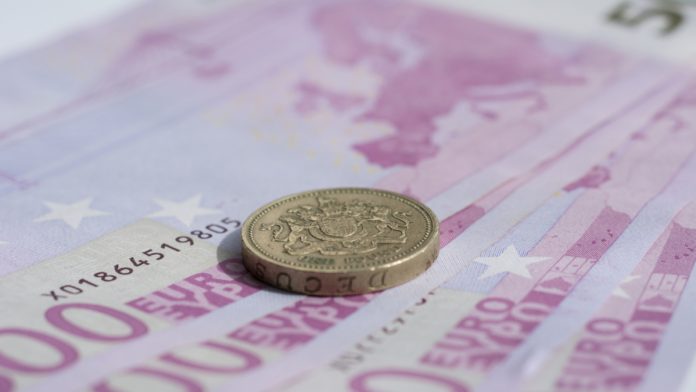- Pound (GBP) rises after 4-days of losses
- UK construction PMI was revised higher to 53.7
- Euro (EUR) is steady as retail sales rise
- German factory orders rose 2.9% YoY
The Pound Euro (GBP/EUR) exchange rate is rising on Thursday after 4 days of losses. The pair fell 0.12% in the previous session, settling on Wednesday at €1.1858 and trading in a range between €1.1853 and €1.1894. At 18:00 UTC, GBP/EUR trades 0.06% at €1.1867.
The pound inched higher on Thursday even as growth in the UK construction sector slowed in August.
According to the latest data from S&P Global, the UK construction PMI fell to 53.6 in August from 55.3 in July. This was below expectations of a fall to 54.9.
Delving deeper into the figures, the survey’s gauge for housing activity reached its highest level in two years. However, the sharp increase in home building was offset by a steep slowdown in the civil engineering sector owing to uncertainty surrounding projects ahead of the chancellor’s budget on October 30th
The data comes after UK services sector activity rose to a four-month high in August and after the manufacturing activity remained in growth territory.
Upbeat data means the Bank of England could be less likely to cut interest rates in the September meeting. The market is not expecting a move from the central bank, which reduced interest rates by 25 basis points in August. The market is pricing in just a 25% probability of a September rate cut.
The euro also remained resilient after retail sales rebounded in July, rising by 0.1% following a decline in June.
The small increase was in line with economists’ forecasts and reflects the region’s sluggish recovery. On an annual basis, retail sales fell by 0.1% in the eurozone, highlighting the ongoing challenges faced by consumer spending.
German factory orders are another source of optimism. They rose by 2.9% month over month in July, the second consecutive month of increase. This is a rare piece of good news for the eurozone’s largest economy.
Recent data from Germany has been disappointing, and this one-off data point is unlikely to brighten the outlook for the eurozone’s struggling economy.
The German manufacturing sector has been hit hard by higher energy costs following the rushes of a Ukraine invasion and amid cooling demand abroad.





